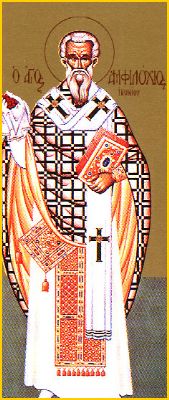|
|||
|---|---|---|---|
| This weekly bulletin insert complements the curriculum published by the Department of Christian Education of the Orthodox Church in America. This and many other Christian Education resources are available at http://dce.oca.org. | |||

Saint Amphilochius, Bishop of Iconium, was from Cappadocia like his contemporary Saint Basil the Great. Also like Saint Basil he had to deal with various false teachings that became popular during his lifetime. One of his chief opponents was Macedonius, a man who didn't merely teach wrong ideas, but used his position as a bishop to persecute some who did not agree. Macedonius was a power-hungry and cruel person who finally fell into disgrace, but not before he had done great damage to the Church and to many believers. The basic teaching of Macedonius and his followers was that the Holy Spirit is merely a created being, not one of the divine and uncreated Persons of the Holy Trinity. His teaching went along with that of the Arians, who taught that Jesus Christ is not the divine Son of God. Bishop Amphilochius argued powerfully against these teachings, knowing that they could lead people to misunderstand the truth about God. He persuaded Saint Basil to write his famous treatise on the Holy Trinity, and stood up to the threats of Macedonius and his friends. Amphilochius also pleaded with the Emperor Theodosius to remove the false teachers from their positions of authority in the Church, especially the Arians who denied the divinity of the Son of God. The emperor was not willing to listen until the saint found an ingenious way of making his point. He asked for an audience with the emperor, and entered the royal chamber in which Theodosius was seated with his son, Arcadius. Giving a proper greeting to Theodosius, Bishop Amphilochius completely ignored Arcadius. This snub of the royal heir angered the emperor, who was ready to punish Amphilochius for it, but the bishop quickly spoke up and said, "Now you see, O Ruler, how you cannot tolerate disrespect to your son! In the same way, God the Father does not tolerate disrespect to His Son, and turns away from those who deliberately dishonor the Lord Jesus Christ and lead others to do the same by false teaching."
Theodosius was amazed at the bishop's willingness to risk his imperial anger, and realized from this how important the matter was. Amphilochius knew that people will lose hope of their own salvation if they do not believe that Jesus Christ is equal in power and mercy to God the Father, and therefore able to save them. In Saint Paul's second letter to the Thessalonians (3: 6-1) he expresses concern about some members of that community who were using their expectation of the Second Coming as an excuse to live in idleness. Paul warns the believers to ignore any such person, and have nothing to do with him. But like Amphilochius, Paul was concerned not with punishing but with saving people. He tells the Thessalonians: "Do not look on him as an enemy, but warn him as a brother." |
|||
